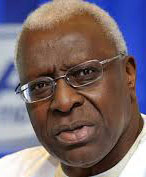PARIS, (Reuters) – French prosecutors have described a web of corruption once rife in world athletics, including bribes paid to cover up athletes’ positive drugs tests, in an indictment recommending that Lamine Diack, the Senegalese former head of the IAAF, and his son stand trial.
The indictment handed to judges by France’s financial prosecutors’ office on Monday accuses Diack and his son Papa Massata of a host of illicit practices over a number of years, including bribe-taking and money-laundering, with the active involvement of international athletes and their federations.
Lamine Diack, 85, who is under house arrest in France, and Papa Massata Diack, who is in Senegal, have denied wrongdoing. Senegal has refused extradition requests for Papa Massata, a businessman who worked as a marketing consultant for the IAAF.
Under French law, the investigating judge now has three months to decide how to proceed with the indictment.
Prosecutors began their investigation in 2015, shortly after the IAAF’s ethics commission and the World Anti-Doping Authority (WADA) uncovered evidence a Russian marathon runner paid 600,000 euros to cover up a positive drug test, allowing her to compete in the London 2012 Olympic Games.
“Under the leadership of its president (Lamine Diack) and over the course of several years of wrongdoing, the IAAF managed to combine corruption with the encouragement of doping,” the prosecutors wrote in the indictment, seen by Reuters.
“(Diack’s) actions, which were in complete contradiction with his role, allowed doping athletes from one country to continue to compete and participate in the biggest world competitions in exchange for money,” it said.
A lawyer representing Diack, William Bourdon, declined to comment. Papa Massata Diack and representatives of the IAAF did not immediately respond to requests for comment.
Citing witnesses and documents, the prosecutors highlight what they describe as the “extremely complacent” attitude of the IAAF towards the Russian athletics federation, and set out the relations between a number of IAAF and national federation officials allegedly involved in corrupt practices.
The Russian athletics federation has been suspended from world competition since November 2015, after WADA published a report containing evidence of widespread, state-sponsored doping in Russian athletics.
In March, French officials issued international arrest warrants for two former Russian athletics officials as part of their investigation into doping cover-ups.
Diack, who led the IAAF from 1999-2015, brought enormous influence to bear on the organisation during that time, including raising the leverage of African athletics federations in decisions over the hosting of international events.
According to the prosecutors, Diack and his son, who oversees a sports consulting business called Black Tidings, solicited payments from athletes, either directly or indirectly, totalling 3.45 million euros in exchange for covering up positive doping tests, allowing the athletes to go on competing.
The investigations being carried out by French authorities into athletics have already resulted in several arrests and agreement by some of those accused to cooperate.
French doctor Gabriel Dolle, the former head of the IAAF’s anti-doping department, has accepted the accusations made against him and asked to receive preferential treatment if he pleads guilty, a deal that is being considered.

